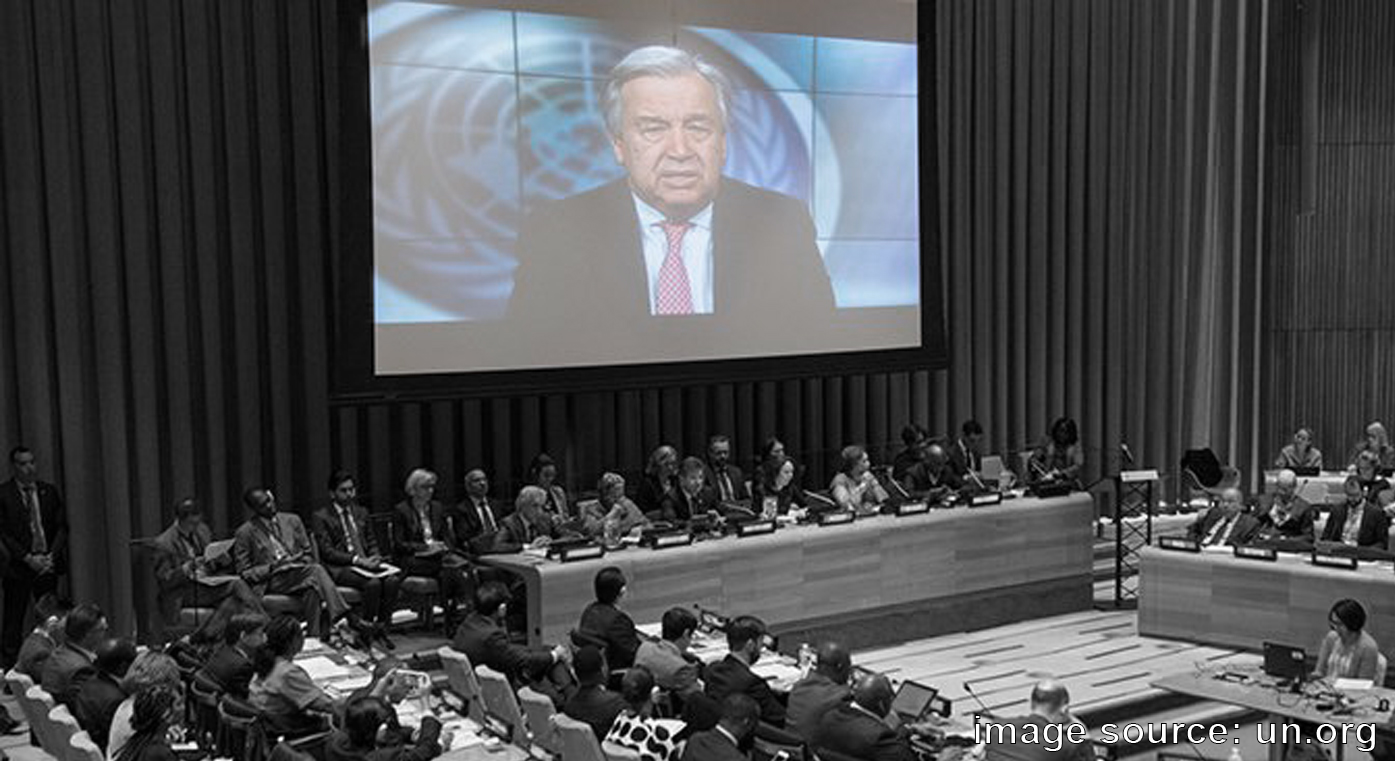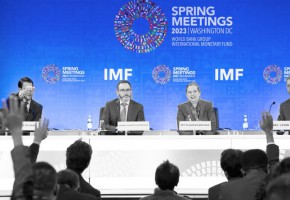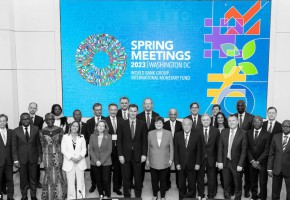
The 2023 UN Financing for Development (FfD) Forum: context and main outcomes

Together, the Bretton Woods Institutions (the World Bank Group and the International Monetary Fund) in addition to the United Nations are part and parcel of shaping global policy making. However, today the world is witnessing a fragmentation of the global order into competing blocks as highlighted in the IMF and World Bank Spring Meetings which addressed, among other pressing issues, the International Financial Architecture and how it could evolve to capture new challenges and systemic risks in a democratic and fair manner.
This article will shed light on the Economic and Social Council (ECOSOC) Forum on Financing for Development (FfD) that took place in April 2023 at the United Nations (UN) Headquarters in New York City, in which ANND was part within the Civil Society FfD Mechanism.
The FfD Forum is a platform for inclusive, multi-stakeholder dialogue to address the current global challenges and advance policies for financing long term sustainable development priorities – in line with its mandate laid out in the Addis Ababa Action Agenda. Indeed, this is a space that tackles financing in a systemic and participatory manner while looking at the underlying drivers of economic inequalities – such as debt crises and the international tax structure. Issues pertaining to financing for development namely Domestic Resource Mobilization (DRM), international private finance, international trade, debt sustainability and international development cooperation are discussed with all stakeholders including developing countries and the process is open to observers including civil society.
This year’s forum held a special importance as it took place amidst multiple crisis including global debt unsustainability, increasing inequalities, inflationary pressures, wars and conflicts impacting global supply chains, and most importantly billion-dollar shortfalls in financing for development. In that regard, CSOs present at the forum advocated for working out a multilateral legal framework for sovereign debt resolution, called for the development of a new UN Tax Convention and highlighted the need to engage in systemic reforms pertaining to the international financial architecture while questioning the role of private finance.
Debt
First, Member States and country groups discussed debt and recognized that there is a debt crisis that is “killing the SDGs and any chance of dealing with the climate emergency”. Indeed, 60% of least developed countries and other low-income countries are now assessed to be at high risk of or already in debt distress, while nearly a third of middle-income countries are at high risk of a fiscal crisis. However, today a functioning framework does not exist to address unsustainable debt levels. Nevertheless, the UN is the only organization with universal membership that could be ready to facilitate inclusive dialogue on sovereign debt as proposed by the UN Secretary General António Guterres. There was a clear divergence between the approach argued by creditors and countries from the Global South; the former argue for a reform of the Common Framework for Debt Treatments relying on G20 proposed solutions, while the latter call for a debt architecture reform explicitly calling for the establishment of a multilateral sovereign debt resolution mechanism.
Tax
Second, on a UN Tax Body and Convention, it is important to recall that discussions around the global tax system started over two decades ago as OECD countries were preventing an agreement to be reached while developing countries have been pushing to solve issues related to the global tax system - particularly international tax dodging costing governments lost tax income every year.
By the end of 2022 the Africa Group proposed a resolution to set up an international UN tax process that was adopted by Consensus by the UN General Assembly. The Africa Group also called for the upcoming UN Tax Process to deliver a Convention on Tax which is supported by a coalition of civil society organizations.
Private finance for development
As the financing gap is growing, some countries – particularly the global North – are increasingly looking to tap in the private sector finance for development. However, although private finance represents one additional source of financing, it must however be carefully addressed in the context of developing finance. When addressing private finance policy makers must take into consideration risks associated with increasing already unsustainable debt levels in developing countries which crowds out other types of much needed spending related, for example, on social protection. Furthermore, private finance is not risk-free as “almost every dollar in private finance ends up extracting more money from the Global South”.
According to Eurodad, “the surge towards financial instruments such as SDG bonds, without any detailed analysis of impact, and an overwhelming emphasis on investor needs” is a one-sided approach to dealing with development finance distorting the purpose of SDGs and setting dangerous precedents for private finance as an end in itself. From a civil society standpoint, it is crucial to ensure that multinational corporations and philanthropists are held accountable for tax evasion and avoidance and start paying their fair share of tax, while private creditors participate in good faith in a global resolution to recognize and address the escalating debt problems.
Outcomes
At the end of the 2023 FfD Forum, governments adopted an Outcome Document in which Member States recognized the need for “improved international debt mechanisms”. However, it remains unclear how governments envisage to explicitly put in place a process under UN auspices to discuss debt architecture reform. Instead, the orientation was to point to the G20, IMF and World Bank, in addition to the recently created Global Sovereign Debt Round table as platforms where debt problems should be addressed. In parallel, the CSOs FfD Mechanism argued that the solution to the debt crisis won’t come from “creditor dominated forums, and needs to be discussed and decided through a member state-led process, under UN auspices with all, borrowers and creditors at the table”. Beyond the Outcome Document, Member States’ statements and country groups at the FfD forum showed a growing and encouraging support to start the discourse in this direction, starting with a broader coordination amongst borrowing countries.
Regarding taxation, the Outcome Document stated the following: “we look forward to the beginning of intergovernmental discussions at United Nations Headquarters in New York on ways to strengthen the inclusiveness and effectiveness of international tax cooperation”. Member States also noted the work of the Addis Tax Initiative in fostering collective action to strengthen the capacities of developing countries for closing recognized gaps in development finance.
As for private finance, the Outcome Document emphasized the importance of developing dynamic domestic private sectors to achieve the SDGs in a sustainable and equitable manner by creating and strengthening an enabling business environment; and reiterated the need for strengthened international cooperation to explore the full range of policy tools to overcome impediments to private investment for sustainable development. Moreover, Member States tackled the need to take steps to ensure and improve micro-, small- and medium-sized enterprises (MSMEs) access to finance, including trade finance, and increase their participation in international trade and investment and digital economy. Finally, Member States encouraged strengthening company sustainability disclosure and the design of policy and regulatory frameworks in support of sustainable finance, through regulations and policies that better link and align profitability and sustainability. The development of classification systems as well as globally consistent and comparable sustainability rating methodologies, which are transparent and traceable, can make sustainable investing more credible.
Way forward
To conclude, the Outcome Document of the 2023 ECOSOC FfD Forum reiterated Member States’ grave concern that recent shocks are threatening to further reverse or delay progress on Sustainable Development Goals (SDGs) by 2030, especially for developing countries with a particular concern on the poorest and most vulnerable.
To face the multiple and interlinked global crises, embracing change is needed by taking immediate measures to scale up efforts to achieve the 2030 Agenda and the Adis Ababa Action Agenda – including though development cooperation, SDG investments, reforming the international financial architecture, enhancing macroeconomic policy cooperation and implementing actions to accelerate sustainable development, in particular in support of developing countries. The Outcome Document also welcomed the efforts exerted by the Secretary General to address the SDG financing gap and called for further discussions on the proposal for an SDG stimulus in a timely manner at the UN to tackle the high cost of debt and rising risks of debt distress, massively scale up affordable long-term financing for development and expand contingency financing for countries in need.
Most recently, in June 2023, as financing is a pressing issue which gap is further increasing, and in complementarity to the international community’s efforts to scale-up access to finance to meet the growing socio-economic development and climate needs, French President Emmanuel Macron has opened a Summit for a New Global Financial Pact in Paris that seeks to find financial solutions to the interlinked global goals of tackling poverty, curbing planet-heating emissions and protecting nature. The Summit aimed at showing a global unity for the international financial architecture reform, nevertheless exposed real discrepancies between the Global South needs and what the Global North is willing to concede. The Summit ended without tangible results, and there were no pacts nor global commitments made.
The UN General Assembly in September, including the SDG Summit; the UNFCCC COP28 in December; the ongoing UN FfD process, with a new FfD conference probably in 2025; are all unique opportunities to promote real transformations based on democratic and fair discussions, with all countries around the table on an equal footing so to enable real transformations.
Olga Jbeili
Recent publications



